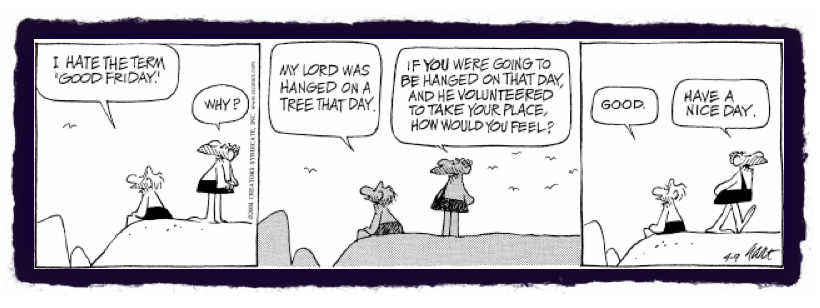Listen:
Consider:
Therefore, since we are surrounded by such a great cloud of witnesses, let us throw off everything that hinders and the sin that so easily entangles. And let us run with perseverance the race marked out for us, fixing our eyes on Jesus, the pioneer and perfecter of faith. For the joy set before him he endured the cross, scorning its shame, and sat down at the right hand of the throne of God. Consider him who endured such opposition from sinners, so that you will not grow weary and lose heart.” Hebrews 12:1-3 (NIV, emphasis mine)
In my song I wrote:
My iniquities You paid
My sin Your joy to bear
Your love that draws and holds me close to You
My line, “my sin Your joy to bear” has messed with some people over the years. They have taken it to mean that I was saying that He was glad/happy to suffer, or that the cross was a happy event. It makes me think of the comic strip B.C., and something they published one year:
The author of Hebrews writes, “For the joy set before him he endured the cross…”. There was a joy that was working in Jesus’ heart that helped Him to keep focused in His mission. What was that joy? I think we can see it in Jesus’ words in John 15:
“As the Father has loved me, so have I loved you. Now remain in my love. If you keep my commands, you will remain in my love, just as I have kept my Father’s commands and remain in his love. I have told you this so that my joy may be in you and that your joy may be complete. My command is this: Love each other as I have loved you. Greater love has no one than this: to lay down one’s life for one’s friends. You are my friends if you do what I command. I no longer call you servants, because a servant does not know his master’s business. Instead, I have called you friends, for everything that I learned from my Father I have made known to you. You did not choose me, but I chose you and appointed you so that you might go and bear fruit—fruit that will last—and so that whatever you ask in my name the Father will give you. This is my command: Love each other.” John 15:9-17 (NIV, emphasis mine)
Union with God, restored relationship, remaining in the love of Christ, loving each other – in this reality we experience a joy that Jesus had.
In other words, joy was His impetus not His reaction. That joy drove Him passionately to His Passion.
JOY IS RELATIONAL
With some of the more recent advances in neuroscience and brain imaging scientists are able to see what is going on in people’s brains when they experience different emotions. And joy, they’ve found, (as far as the nervous system is concerned) is the sense that ‘someone is glad to be with me.’
Author Jim Wilder writes,
Many definitions of joy are static descriptions of a “state” similar to what we might say for a flavor like “salty.” From the human brain perspective, joy is more of a dynamic relational experience. Joy is a “glad to be together” state amplified between two minds that are glad to be together at that moment. Joy is relational.
Joy is relational. It is a dynamic relational experience.
Joy (if you’ve watched the animated film Inside Out) is one of the first emotions that we experience in our development. Why? Because when we see a baby, we smile at it. When this happens, a child’s earliest development is in an environment where it experiences that people are happy to be with them. They’re experiencing joy, and we see that when they smile back, or run toward us, happy to see us too. Often, in a healthy environment anyway, the existence of the child was waited for, prayed for, and full of hope. Maybe that’s why we call them a what? A bundle of…joy.
Again, joy is relational.
Here in Scripture, we see a ‘joy’ at work in driving Jesus’ mission of reuniting Heaven and Earth, and restoring our broken relationship with the Father, all the way to the ground zero of Golgotha. In the suffering, even before the view of an empty tomb, the joy set before Him was you and I having a restored relationship with the Father, and lives connected to Him through the Helper (Holy Spirit). His joy (‘glad to be with us’ vision) bore the weight of our sin and brokenness. It made it all worth it for Him.
Reflect:
In what ways are you experiencing God’s delight in you?
I invite you to write a prayer of gratitude to the Lord as an expression of worship, as you celebrate Good Friday today.
Reference:
Jim Wilder, Conversations Journal: A Forum for Authentic Transformation, Fall/Winter 2014, Issue 12.2: Flourishing


